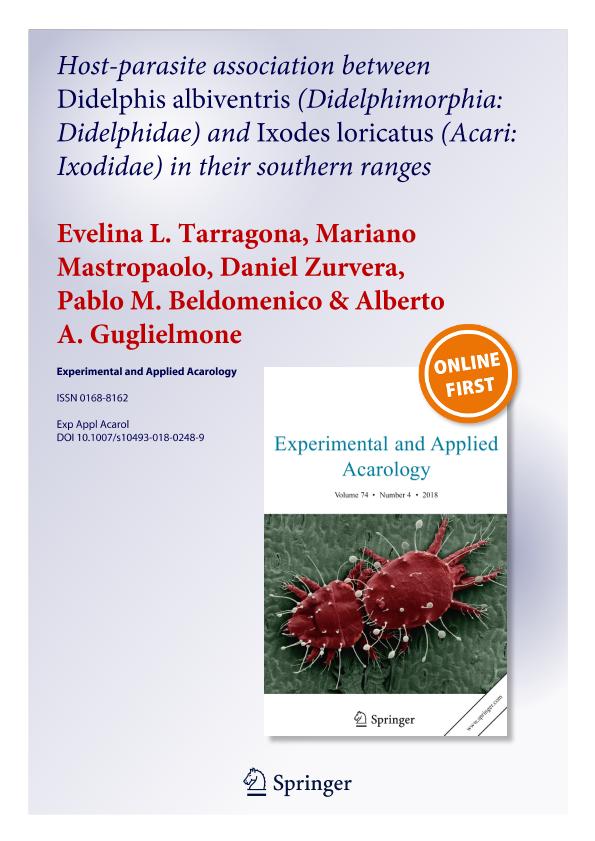Artículo
Host-parasite association between Didelphis albiventris (Didelphimorphia: Didelphidae) and Ixodes loricatus (Acari: Ixodidae) in their southern ranges
Tarragona, Evelina Luisa ; Mastropaolo, Mariano
; Mastropaolo, Mariano ; Zurvera, Daniel; Beldomenico, Pablo Martín
; Zurvera, Daniel; Beldomenico, Pablo Martín ; Guglielmone, Alberto Alejandro
; Guglielmone, Alberto Alejandro
 ; Mastropaolo, Mariano
; Mastropaolo, Mariano ; Zurvera, Daniel; Beldomenico, Pablo Martín
; Zurvera, Daniel; Beldomenico, Pablo Martín ; Guglielmone, Alberto Alejandro
; Guglielmone, Alberto Alejandro
Fecha de publicación:
05/2018
Editorial:
Springer
Revista:
Experimental and Applied Acarology
ISSN:
0168-8162
Idioma:
Inglés
Tipo de recurso:
Artículo publicado
Clasificación temática:
Resumen
The parasitism of Ixodes loricatus Neumann on white-eared opposum, Didelphis albiventris Lund, was analysed in the southern ranges of both. In central Argentina, 118 wild opossums were captured from 2005 to 2012. Adults of I. loricatus were collected (prevalence = 66.1%, mean = 7.03, median = 4), but no immature stage. Tick infestation was not affected by sex (p = 0.27) or age (p = 0.37) of hosts. In line with previous studies about seasonality of larvae and nymphs of I. loricatus, adult tick infestation showed no seasonal trend. This lack of seasonal pattern of infestation for all parasitic stages of I. loricatus may indicate a life cycle governed by nidicolous behaviour, in such a way that this habit would contribute to minimize the influence of external environmental variables. The tick sex ratio was female biased, with two females per one male (p = 0.002). The absence of I. loricatus immatures on D. albiventris suggests that in the study region there is clear segregation of immatures in rodents and adults in marsupials.
Archivos asociados
Licencia
Identificadores
Colecciones
Articulos(CCT - SANTA FE)
Articulos de CTRO.CIENTIFICO TECNOL.CONICET - SANTA FE
Articulos de CTRO.CIENTIFICO TECNOL.CONICET - SANTA FE
Citación
Tarragona, Evelina Luisa; Mastropaolo, Mariano; Zurvera, Daniel; Beldomenico, Pablo Martín; Guglielmone, Alberto Alejandro; Host-parasite association between Didelphis albiventris (Didelphimorphia: Didelphidae) and Ixodes loricatus (Acari: Ixodidae) in their southern ranges; Springer; Experimental and Applied Acarology; 75; 1; 5-2018; 129-134
Compartir
Altmétricas



